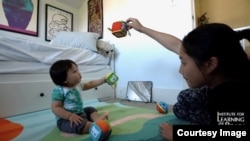It is common for adults to use “baby talk” when interacting with very young children. This way of speaking attempts to copy the sounds babies make when they first try to talk. But is this form of communication helpful to a child’s development?
Several studies have suggested a clear link between parental language methods and a child’s early language development.
Studies showed that language learning in babies was improved when parents spoke more than a few simple words and used a wider vocabulary. Earlier research found that the style of speech used by parents to communicate with their baby could increase language development.
One such speaking style is known as “parentese.” Research has shown that babies react better to this kind of language in the first months of life.
Generally, parentese involves adults speaking in a higher voice and at a slower speed. The language is simplified, while sentences are short and often repeated. Studies from the past 30 years have confirmed that babies spoken to in parentese developed larger vocabularies throughout the first three years of life.
A new study on the subject examined whether parents can be effectively taught methods to improve their parentese skills. The study was a project of the University of Washington’s Institute for Learning & Brain Sciences.
Patricia Kuhl is a professor of speech and hearing sciences, and serves as co-director of the institute. She says the goal of the study was to find out whether a parent can be “coached” to create their own speaking style to improve language learning in children.
Naja Ferjan Ramírez helped lead the study. She also is with the Institute for Learning & Brain Sciences. She said that the parents involved in the research were first shown the importance of language input for their baby’s development. Parents were then given suggestions on how to use different parentese methods. They were then rated on how well they used these methods with their child.
“Most parents know that the amount of language their child hears is important,” Ferjan Ramírez said. “What we shared with them through coaching is that how they talk to their baby may matter even more.”
She added that the new study is important because there are still a lot of parents with little knowledge about how to use parentese to help their child. This was one reason the researchers included parents from different cultural and economic groupings, she said.
For the experiment, parents were given a small recording device, which they placed inside a piece of their baby’s clothing. All spoken communication from parents and child were recorded during a whole weekend as the family took part in normal activities.
The recordings were made at three different periods of the child’s life, when the youngster was six, 10 and 14 months old. The parents were divided into two groups: a control group and an intervention group. Those in the intervention group received coaching after their six and 10-month recordings.
Ferjan Ramírez said the parents who received coaching greatly increased the amount and effectiveness of parentese than the other parents. “But the most exciting finding was that babies of parents who received coaching showed better language skills at 14 months,” she added.
The study found that between the ages of six and 14 months, coached parents increased the amount of speech directed to the child and their use of parentese by 15 percent. Parents in the control group showed less growth in those areas, about 7 percent.
To measure a baby’s language skills, the team measured levels of what the researchers describe as “babbling.” The team defined babbling as the use of vowels and vowel syllables, or parts of word-like sounds.
Babbling can sometimes also include actual words if they can be clearly recognizable as such.
Ferjan Ramírez said increases in babbling are likely to lead to long-term improvements in child development. “This is important because we know that early language skills are important predictors of later language, and of children's ability to learn to read and succeed in school,” she said.
I’m Bryan Lynn.
Bryan Lynn wrote this story for VOA Learning English, based on the University of Washington study and online sources. George Grow was the editor.
_______________________________________________________________
_______________________________________________________________
Words in This Story
vocabulary – n. the words that make up a language
style – n. a way of doing something
coach – v. to teach people how to get better at something
vowel – n. one of the letters a, e, i, o, u and sometimes y
syllable – n. one of more sounds in a word







